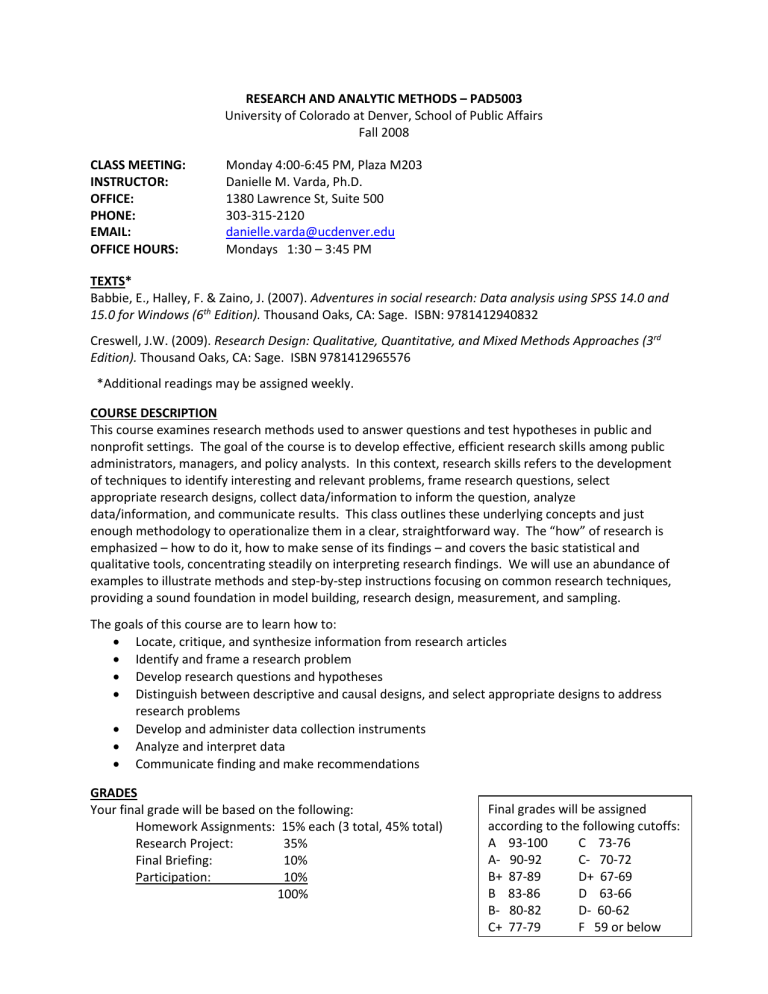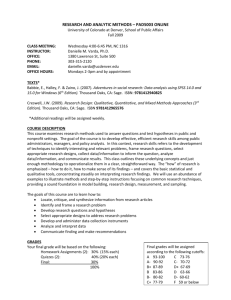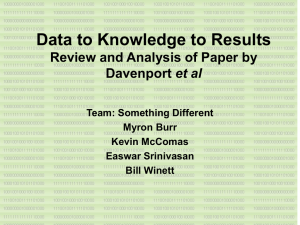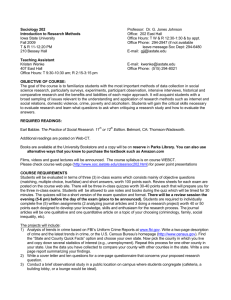RESEARCH AND ANALYTIC METHODS * PAD5003

RESEARCH AND ANALYTIC METHODS – PAD5003
University of Colorado at Denver, School of Public Affairs
Fall 2008
CLASS MEETING:
INSTRUCTOR:
OFFICE:
PHONE:
EMAIL:
OFFICE HOURS:
Monday 4:00-6:45 PM, Plaza M203
Danielle M. Varda, Ph.D.
1380 Lawrence St, Suite 500
303-315-2120 danielle.varda@ucdenver.edu
Mondays 1:30 – 3:45 PM
TEXTS*
Babbie, E., Halley, F. & Zaino, J. (2007). Adventures in social research: Data analysis using SPSS 14.0 and
15.0 for Windows (6 th Edition). Thousand Oaks, CA: Sage. ISBN: 9781412940832
Creswell, J.W. (2009). Research Design: Qualitative, Quantitative, and Mixed Methods Approaches (3 rd
Edition). Thousand Oaks, CA: Sage. ISBN 9781412965576
*Additional readings may be assigned weekly.
COURSE DESCRIPTION
This course examines research methods used to answer questions and test hypotheses in public and nonprofit settings. The goal of the course is to develop effective, efficient research skills among public administrators, managers, and policy analysts. In this context, research skills refers to the development of techniques to identify interesting and relevant problems, frame research questions, select appropriate research designs, collect data/information to inform the question, analyze data/information, and communicate results. This class outlines these underlying concepts and just enough methodology to operationalize them in a clear, straightforward way. The “how” of research is emphasized – how to do it, how to make sense of its findings – and covers the basic statistical and qualitative tools, concentrating steadily on interpreting research findings. We will use an abundance of examples to illustrate methods and step-by-step instructions focusing on common research techniques, providing a sound foundation in model building, research design, measurement, and sampling.
The goals of this course are to learn how to:
Locate, critique, and synthesize information from research articles
Identify and frame a research problem
Develop research questions and hypotheses
Distinguish between descriptive and causal designs, and select appropriate designs to address research problems
Develop and administer data collection instruments
Analyze and interpret data
Communicate finding and make recommendations
GRADES
Your final grade will be based on the following:
Homework Assignments: 15% each (3 total, 45% total)
Research Project: 35%
Final Briefing:
Participation:
10%
10%
100%
Final grades will be assigned according to the following cutoffs:
A 93-100
A- 90-92
B+ 87-89
B 83-86
B- 80-82
C+ 77-79
C 73-76
C- 70-72
D+ 67-69
D 63-66
D- 60-62
F 59 or below
Final Project
The final project will be described in class with a written description handed out on September 8, 2008.
In general, the final project will be a research project that will require you to apply the skills you have learned in class. You will be asked to design a research prospectus which will include research questions, a literature review, identification of variables, a research design to include a data collection method and plan for analysis, and finally, a narrative of your dissemination/communication plan. The final product should be no longer than 15 pages, double spaced. A bibliography will be required (not included in the 15 page max). This project will be due before the fall break (by November 23). You will be required to prepare an oral presentation (called a briefing) of your final project that you will present during one of the last two days of class.
CLASS POLICY
1.
The lectures, class discussions, and cases are an important part of learning. Therefore, missing too many classes suggests it will not be possible for you to attain the course objectives. You do not need to notify me when you miss a class; however, it is expected that you will obtain notes and information about class assignments from other students prior to the next class so you will be prepared after the class you have missed.
2.
Homework, papers, and presentations not turned in on time will be reduced by one-third of a letter grade for each day it is late (for example, one third reduction represents, for example, moving from a B to a B-).
3.
Throughout the semester you will be asked to participate in group exercises, complete in-class labs, discuss readings, share examples, and/or demonstrate techniques. Each of these will be credited towards your participation grade. Therefore, you should expect to be present and to participate fully in these exercises to receive the full participation grade.
ACADEMIC HONESTY
As members of the University of Colorado Denver academic community, faculty and students accept the responsibility to maintain the highest standards of intellectual honesty and ethical conduct in completing all forms of academic work at the university. Plagiarism is the use of another person’s distinctive ideas or words without acknowledgement. The incorporation of another person’s work into one’s own requires appropriate identification and acknowledgment, regardless of the means of appropriation. SPA students are responsible for being attentive to or observant of campus policies about academic honesty as stated in the University’s Student Conduct Code.
SCHEDULE
The following schedule is subject to change at the discretion of the instructor. Therefore, consider the following as a tentative schedule.
WEEK
OF
TOPIC READINGS –
Completed by this Date
ASSIGNMENTS
08-11
Course Overview
Introduction to Research
-The Research Process
-Identifying Problems
Ongoing:
Article/Example
Identification
-Developing Research Questions
08-18
08-25
09-01
09-08
09-15
09-22
09-29
10-06
10-13
10-20
10-27
11-03
11-10
11-17
11-24
12-01
12-08
Literature Reviews
Theory and Research
Identifying Variables
-Developing Hypotheses
-Conceptual Frameworks
NO CLASS: DNC
NO CLASS: UNIVERSITY HOLIDAY
Ethical Issues in Research
Research Designs: Descriptive, Causal, Case
Studies, Mixed Methods
Analytic Method Topic 1: Quantitative Data
-Validity/Reliability
-Sampling
-Data Collection
-Intro to SPSS
Analytic Method Topic 1: Quantitative Data
Univariate Statistics
-Descriptive Statistics, Graphs, & Charts
Analytic Method Topic 1: Quantitative Data
Bivariate Statistics
-Measures of Association
-Tests of Significance
Analytic Method Topic 1: Quantitative Data
Bivariate Statistics, cont.
Multivariate Statistics
Analytic Method Topic 2: Qualitative Data
Data Collection
Analytic Method Topic 2: Qualitative Data
Data Analysis
Interpreting Results
Analytic Method 3: Relational Data
Data Collection
Analytic Method 3: Relational Data
Data Analysis
Interpreting Results
Mixed Methods
Communicating Results
Making Recommendations
Briefing Your Results
NO CLASS: FALL BREAK
Briefings
Briefings
Creswell: Ch 2,3,
5-7
HW1 Distributed
Complete survey
Creswell: Ch 1,8-
10, and pages 87-
94
Babbie: Ch 1-5
HW1 Due in Class
Description of Final
Project Handed Out in
Class
Babbie: Ch 6-9
(lab time)
Babbie: Ch 11-15
(lab time)
Babbie: Ch 14-15,
17-18
(lab time)
Creswell: Ch 9
Readings TBD
Readings TBD
HW2 Distributed
HW2 Due in Class
HW3 Distributed
Readings TBD
Readings TBD
Creswell: Ch 10
Readings TBD
HW3 Due in Class
Final Project Due 11/23 by Email
Final Briefings in Class
Final Briefings in Class








